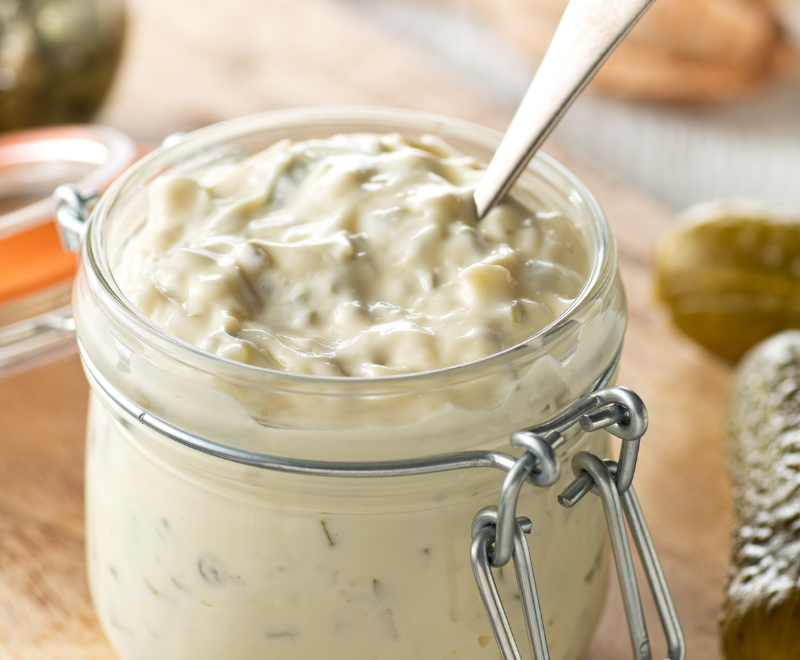Tartar sauce, that creamy, tangy condiment beloved by seafood lovers, is a staple on many tables. But like all food products, it has a limited shelf life and can spoil if not handled properly. Understanding how long tartar sauce lasts and the best practices for storage can help you avoid unpleasant surprises and ensure you’re enjoying this delicious condiment at its peak freshness. This article will delve into the intricacies of tartar sauce shelf life, guiding you through the factors that influence its longevity and providing practical tips for safe consumption.
This comprehensive guide will explore the expiration date of tartar sauce, examine the shelf life of both unopened and opened containers, outline proper storage techniques, and discuss the potential risks associated with consuming expired tartar sauce. By the end of this article, you’ll have a clear understanding of how to maximize the freshness and safety of your tartar sauce.
Tartar Sauce Expiration Date
The expiration date on a bottle of tartar sauce indicates the manufacturer’s recommended timeframe for optimal quality and flavor. This “best by” or “use by” date is based on laboratory testing and ideal storage conditions. While it’s not a strict deadline, exceeding this date can lead to a decline in taste and texture, as well as an increased risk of spoilage.
It’s important to note that the expiration date applies to unopened tartar sauce stored under recommended conditions. Once opened, the shelf life significantly shortens due to exposure to air and potential contamination. Always check both the expiration date and the “opened” storage guidelines for accurate information about your specific bottle of tartar sauce.
Shelf Life of Unopened Tartar Sauce
Unopened tartar sauce typically boasts a longer shelf life than its opened counterpart. While the exact duration varies depending on the brand and manufacturing process, unopened tartar sauce can generally remain safe and flavorful for several months past its expiration date when stored properly.
Ideal storage conditions for unopened tartar sauce include a cool, dark place away from direct sunlight and heat sources. A pantry or cupboard with consistent temperatures is usually suitable. Remember that extreme temperature fluctuations can negatively impact the quality of the condiment.
Shelf Life of Opened Tartar Sauce
Once opened, tartar sauce’s shelf life significantly diminishes due to exposure to air and potential contamination. It’s crucial to refrigerate opened tartar sauce immediately after use and consume it within a week or two for optimal freshness and safety.
Refrigeration slows down bacterial growth, extending the shelf life of opened tartar sauce. However, even when refrigerated, it’s essential to monitor for any signs of spoilage, such as an off odor, discoloration, or unusual texture. If you notice any of these indicators, discard the tartar sauce immediately.
Storing Tartar Sauce Properly
Proper storage is paramount to maximizing the shelf life and safety of your tartar sauce. Here are some key tips:
Refrigeration is Key
Always refrigerate opened tartar sauce promptly after use. This slows down bacterial growth and helps maintain its freshness. Store it in a tightly sealed container to prevent contamination from other foods in the refrigerator.
Avoid Temperature Fluctuations
Store tartar sauce in a cool, consistent environment. Avoid placing it near heat sources or in areas with fluctuating temperatures, as these conditions can accelerate spoilage.
Check for Expiration Dates
Always check the expiration date on your tartar sauce bottle before purchasing or consuming it. While unopened tartar sauce may last beyond its “best by” date under ideal storage conditions, exceeding this timeframe increases the risk of spoilage.
Risks of Eating Expired Tartar Sauce
Consuming expired tartar sauce can pose potential health risks due to bacterial growth. Bacteria thrive in warm, moist environments, and tartar sauce provides a suitable breeding ground for these microorganisms.
Does tartar sauce expire? Does tartar sauce go bad? Yes, it does. When tartar sauce expires, bacteria can multiply rapidly, leading to food poisoning symptoms such as nausea, vomiting, diarrhea, abdominal cramps, and fever. In severe cases, food poisoning can result in hospitalization or even death.
Signs of Spoilage
Be vigilant for signs of spoilage in your tartar sauce, including:
- Off Odor: A sour, rancid, or unusual smell indicates bacterial growth.
- Discoloration: Changes in color, such as a greenish hue or cloudiness, suggest spoilage.
- Unusual Texture: If the tartar sauce appears watery, slimy, or has an abnormal consistency, discard it immediately.
What happens if you eat expired tartar sauce? Eating expired tartar sauce can lead to unpleasant and potentially dangerous consequences. It’s always best to err on the side of caution and discard any questionable condiment.
Conclusion
Understanding the shelf life and proper storage practices for tartar sauce is essential for ensuring its safety and quality. While unopened tartar sauce can last several months past its expiration date, opened containers should be refrigerated and consumed within a week or two. Always check for signs of spoilage and discard any expired or questionable tartar sauce to avoid potential health risks. By following these guidelines, you can enjoy your favorite condiment at its best while minimizing the chances of foodborne illness.



